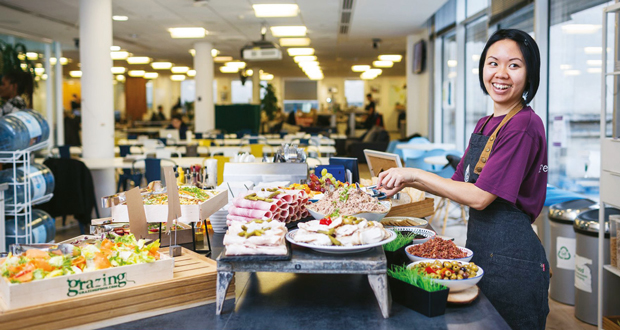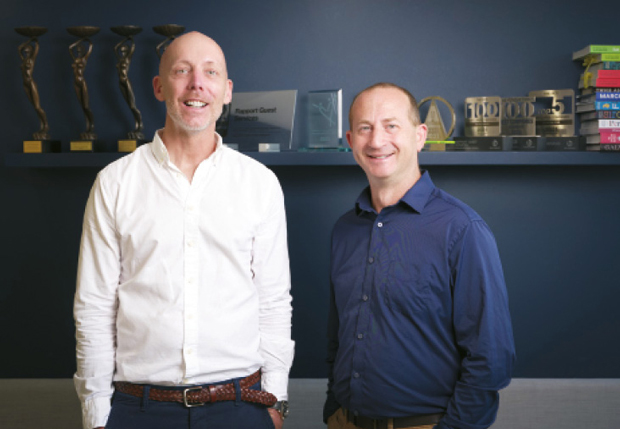A move to new offices required a rethink on how to ensure the site was able to deliver a full food offer. Pernod Ricard and catering partner Grazing reveal to Piers Zangana how using a central production unit has resulted in a popular and sustainable foodservice
When the UK-based businesses of wine and premium spirits company Pernod Ricard moved into new offices in London’s Chiswick four years ago, the group saw an opportunity to bring a caterer on board that could help it further support employee wellbeing and promote a culture of ‘conviviality’ – one of the company’s core values.
With around 600 colleagues in total based at the site, Pernod Ricard’s London office will often see more than 50 per cent occupancy in its building, with teams spanning functions including marketing, HR and sales teams working across Pernod Ricard’s UK domestic and Global Travel Retail affiliates, as well as brand companies Chivas Brothers and The Absolut Group.
 However, the brief for catering was far from straightforward when its caterers first took on the contract. “When we were first approached to tender, we were made aware of the restrictions with spacing in the new building,” says Sam Hurst, Chief Grazer and Chief Executive at Grazing, the company’s long-term catering partner.
However, the brief for catering was far from straightforward when its caterers first took on the contract. “When we were first approached to tender, we were made aware of the restrictions with spacing in the new building,” says Sam Hurst, Chief Grazer and Chief Executive at Grazing, the company’s long-term catering partner.
Pernod Ricard’s previous office, Chivas House in Hammersmith, had a full catering and kitchen offer. “Whilst we knew the new building had limited space, food has always played a huge role in what we do for our teams at the business,” says Jamie Fallon, Pernod Ricard Assistant Facilities and Office Manager.
“Our team knew that, in order to live by our ‘conviviality’ ethos, we couldn’t afford to lose the togetherness a dining space brings. It’s a massive incentive for our staff.”
FLEXIBLE MODE
That is where Grazing was able to step in. Grazing’s business model is centred around flexibility – allowing businesses to dial volume up or down – and preparing food offsite to deliver into client offices, requiring minimal kitchen facilities. Food is prepared and cooked at Grazing’s central production unit (CPU) in Bermondsey’s Old Jamaica Business Estate and delivered, usually by zero emission cargo bikes.
Pernod Ricard didn’t require a full kitchen, but it did require a full food offer. In addition, the food offer needed to align with the type of guests the team welcome every day into the building. With people coming from all over the world, a ‘safe’ menu cycle wouldn’t cut it.
Hurst says: “The brands in the building were all quite different so we didn’t want to offer a safe curry on a Tuesday, or fish and chips on a Friday. We wanted to match the energy of the people entering the space so we are always trying to up the game and offer new and interesting dishes wherever possible.
“Prior to the move, we actually worked with the designers to see what spaces they could make available and we tailored our offer accordingly. For example, we created a ‘grab and go’ concept for quick service, a served counter for hot food, and a high-level hospitality offer for bigger events.”
“We have two kitchens – one for hospitality, one for lunch – but if we were cooking everything onsite, we’d need to reallocate space,” explains Fallon. “It minimises the cost and risk associated with having a fully operational commercial kitchen on site.”
After a considered procurement process, delivered-in catering specialist Grazing was identified as the business model best able to meet these shifting numbers.






